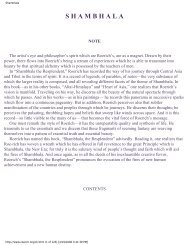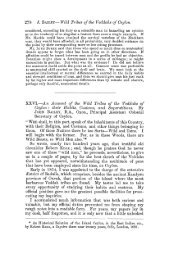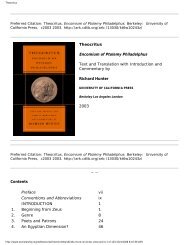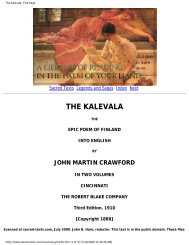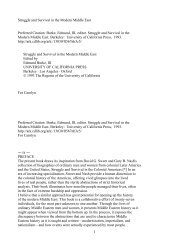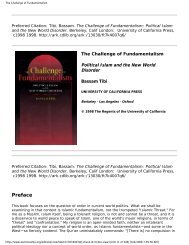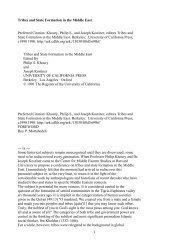Between Two Worlds Kafadar.pdf
Between Two Worlds Kafadar.pdf
Between Two Worlds Kafadar.pdf
Create successful ePaper yourself
Turn your PDF publications into a flip-book with our unique Google optimized e-Paper software.
like "origins," "genealogy," and "sequentiality of events" once again, though in<br />
a new manner. An example of this new spirit may be the popularity and esteem of<br />
Umberto Eco's Name of the Rose in the 1980s. I am not referring to the<br />
historical setting and flavor provided by a scholarly concern with authenticity<br />
but something more intrinsic to<br />
― xiii ―<br />
the novel: its plot. After all, had William of Baskerville, the detective-monk,<br />
inquired into the succession of head librarians in the abbey, had he pursued, as<br />
a traditional historian would have, the succession of events related to the<br />
library in chronological order, he would have discovered much sooner that Jorge<br />
of Burgos should have been the prime suspect.[3]<br />
This trend is accompanied by a renewed interest in narrative sources, which were<br />
once seen as inferior to quantifiable records. Turning the tables around,<br />
historians now indulge in the application of literary criticism or<br />
narratological analysis to archival documents, to even such dry cases as census<br />
registers, which have been seen as hardly more than data banks in previous<br />
history-writing.[4]<br />
It is not merely in the context of developments in world historiography that we<br />
should situate trends in Ottoman studies. For one thing, the two are hardly ever<br />
synchronized, since Ottomanists are often in the role of belated followers<br />
rather than innovators or immediate participants. Besides, history-writing, like<br />
any other kind of writing, needs to be viewed through its entanglements in the<br />
sociocultural and ideological context of its time and stands at a particular<br />
moment of an evolved intellectual/scholarly tradition. As the late classicist<br />
Sir Moses Finley has demonstrated in his Ancient Slavery and Modern Ideology,<br />
the temporal distance of the period under investigation does not necessarily<br />
provide it with immunity against the influence of present-day concerns.[5]<br />
In Ottoman and Turkish studies, too, it is certainly true that the intensity of<br />
the ideological dimension in historical investigation does not diminish as one<br />
moves back in time. In fact, the period of Turkish migrations into and invasions<br />
of Anatolia and the eventual establishment of Ottoman power over what had been<br />
the Byzantine Empire must be one of the most ideologically laden, for reasons I<br />
hope will become apparent to the readers of this book. It may be due partly to<br />
such an awareness that lately more studies are published on the historiography<br />
of that formative period (pre- and early Ottoman) than straight histories. In<br />
fact the ongoing assessment of the gaza thesis can be seen as part of the same<br />
historiographic stocktaking.[6]<br />
This book itself is partly an extended historiographic essay on the rise of the<br />
Ottoman state and on the treatment of this theme in historical scholarship. It<br />
is also an attempt to develop, through this dialogue with Ottomanist<br />
scholarship, a new appraisal of the medieval Anatolian frontier setting, with<br />
its peculiar social and cultural dynamics, which enabled the emergence of<br />
Ottoman power and thus played a major role in shap-<br />
3




